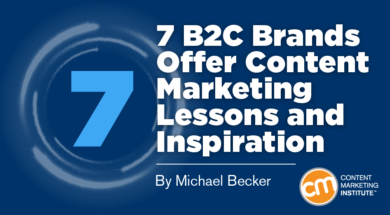
Though an astounding 86% of B2C marketers use content marketing, the successful ones represent a smaller percentage.
That’s what prompted me to identify brands excelling at content marketing. These seven retail brands have committed, consistent, and differentiated content programs. Read on to see how they deliver what their audience wants.
MVMT
Recognized as the first watch company built on a direct-to-consumer model, MVMT smartly leverages influencer partnerships and multimedia storytelling with the appeal of almost global grandeur. It does this via its blog – targeting on-the-move go-getters who live life on their own terms.
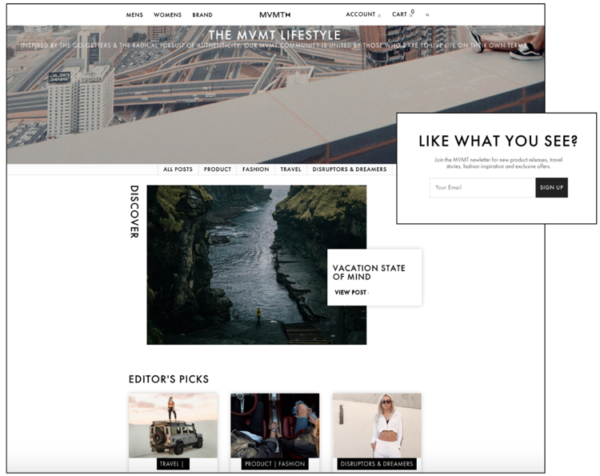
Gone is boring product-focused content and self-promotional jargon. It focuses on the life its audience is living (or wants to live) with categories like travel, disruptors and dreamers, and fashion.
MVMT’s blog often incorporates its partnerships with well-known fitness, fashion, and style connoisseurs. By connecting these influencers with its blog, MVMT can see the benefit of content amplification and greater credibility because these influencers often have a lot of Instagram followers (which works well for visually impressive content like MVMT’s) and have become recognized voices in their respective niches.
Unique watch brand @mvmt’s blog partners w/ fitness, fashion, & style #influencers, says @mjbecker_.
Click To Tweet
Morgan Oliver Allen is one of the featured influencers. Morgan, who has over 100,000 followers on Instagram, is profiled in the Disruptors and Dreamers category. MVMT also doesn’t use a traditional format to tell the story – it breaks it up in short sections (bio, what moves you, quote) and powerful imagery.
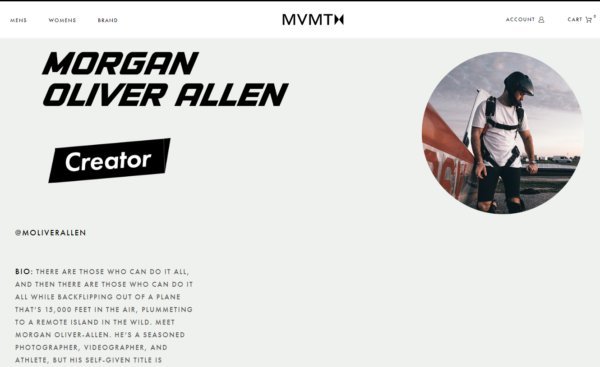
BONUS TIP: MVMT’s blog isn’t limited to text. It uses multiple formats, including video, to appeal to its audience’s preferred modes of content consumption.
![]()
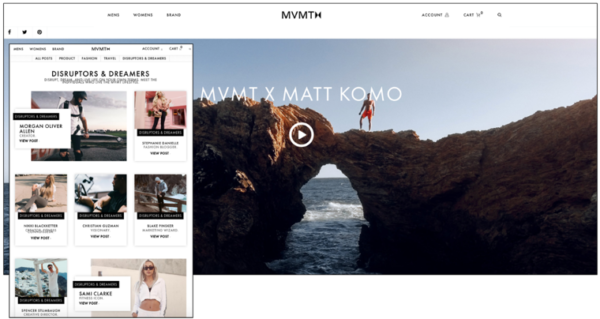
MVMT incorporates options-to-buy within its content, but not until the reader has found value. It also does it in a way that doesn’t disrupt the user experience.
HANDPICKED RELATED CONTENT:
Walmart
The world’s No. 1 revenue-generating company (more than $500 billion in annual revenue) with 2.3 million employees has vivacious content marketing.
With hundreds of millions of customers, how does Walmart tackle its audience outreach? One of its major initiatives is its branded blog, Walmart Today. With a more traditional digital editorial look and feel, the blog addresses a slew of news- and business-related topics of interest to Walmart’s wide audience. Much of the content focuses on community, giving, service, and volunteering to showcase how the brand is implicitly or explicitly improving the world.

The mega retailer also has Walmart Labs hosted on Medium, which includes its Tech Blog where behind-the-scenes team members share insights on advanced, technical topics.
Dick’s Sporting Goods
Dick’s Pro Tips blog includes content popular in many content marketing programs – checklists, guides, how-to, training, and tools – to help its audience of athletes and sports fanatics.
Its high-quality, relevant content is provided in multiple formats with the goal of helping its customers get better at their craft.
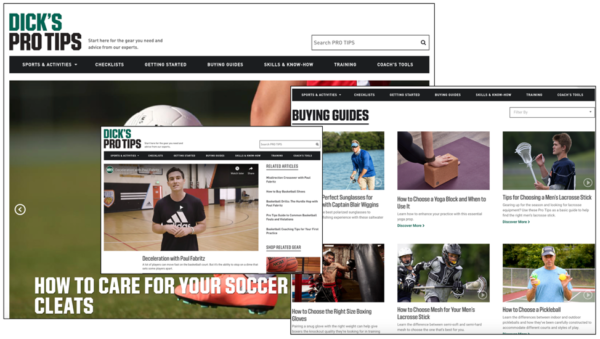
The blog is fresh and simple. It’s designed to spur users to engage in a bit of binging, incorporating elements like:
.@Dick’s Pro Tips #blog is designed to spur users to engage in #content binging, says @mjbecker_.
Click To Tweet
- Related articles in the right sidebar of posts
- You may also like articles at the end of posts
- Shop-related gear in the right sidebar of posts
- A sliding hero banner on the main page with top picks
Each article’s page is its own resource, including text, links to related content, videos, and buying guides.
This narrowly focused post – How to Choose a Yoga Block and When to Use It – reflects the multimedia opportunity for readers.
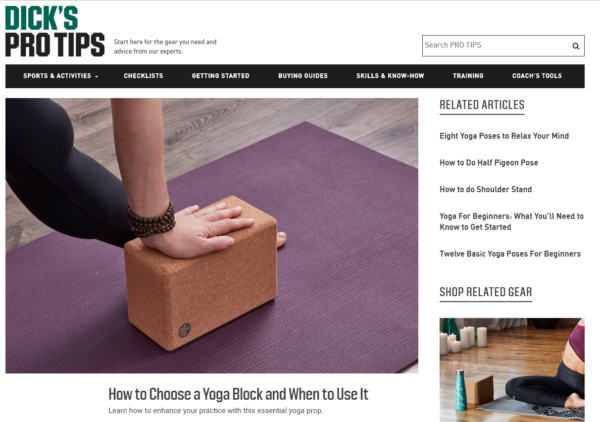
Scroll down farther to see graphic illustrations:
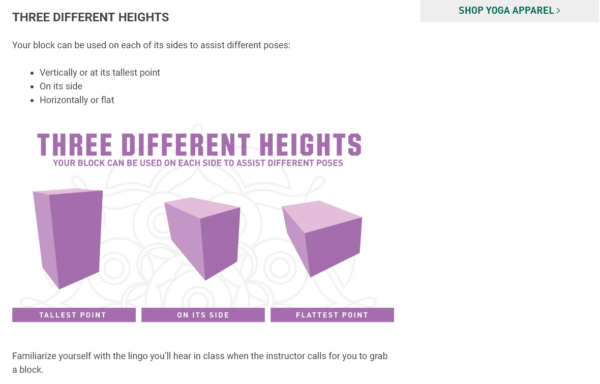
Scrolling down, viewers who learn better by seeing rather than reading can watch this video, which breaks down the activity:
If you’re a customer who’s interested in getting better at your sport activity, Dick’s has positioned itself as a go-to resource.
H&M
How does one of the most successful apparel brands in the world grow its audience and spread its fashion flavor? H&M launched an online magazine to supplement its audience growth potential.
“Dedicated to fashion, beauty and culture,” H&M Magazine offers daily updates and inspiration from all over the world. Content is multifaceted and multiform. It combines visual elements, text, and video posts to enhance overall quality and create a smoother user experience. It truly feels like a magazine you want to read.

H&M is a gigantic consumer brand. A digital magazine isn’t going to be solely responsible for its success. However, the investment in the magazine allows the company to further cultivate an audience of energetic, educated brand fans.
.@hm’s investment in its digital mag cultivates an audience of energetic, educated brand fans. @mjbecker_
Click To Tweet
Mrs. Meyer’s
In an advertising class in college, I had to write 100 headlines to sell a household cleaner. Researching and creating crafty blurbs for Mrs. Meyer’s, though, showed me what an amazing brand it is.
Its content hub caters to a clearly identifiable audience, and the content goes beyond describing why the cleaner is good. It also isn’t the type of content you’d expect for a cleaning brand. Content from Mrs. Myer’s is designed to encourage readers to “Get Making” – focusing on DIY projects, offering actionable pointers on cleaning, and even sharing recipes.
.@MrsMeyersClean #content hub focuses on a niche audience – the makers, says @mjbecker_.
Click To Tweet
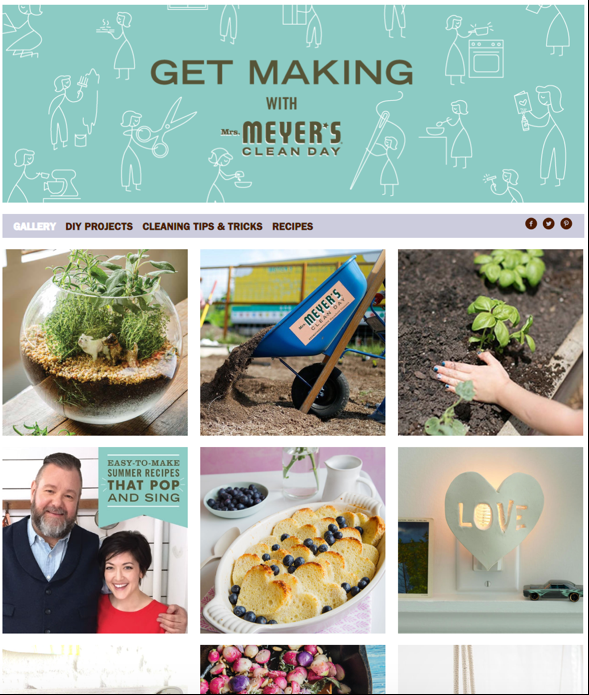
Though Mrs. Meyer’s wants to sell its products to as many people as possible, it deliberately narrowed the niche for its content to focus on the makers in the wider audience.
For example, this article about how to make a rope lamp won’t appeal to the masses, but it will inspire the makers:
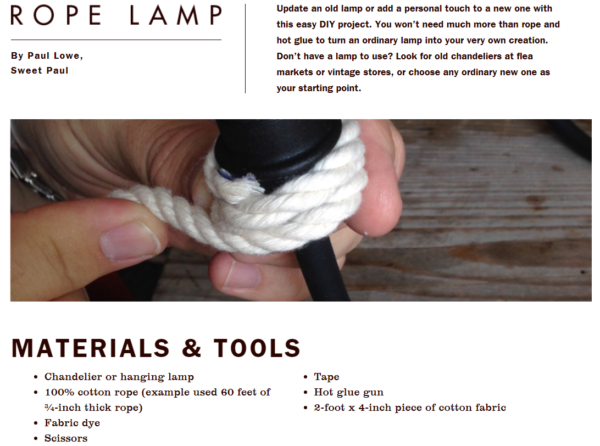
BONUS TIP: Notice how the “ingredients” in this DYI project don’t include any of the brand’s products.
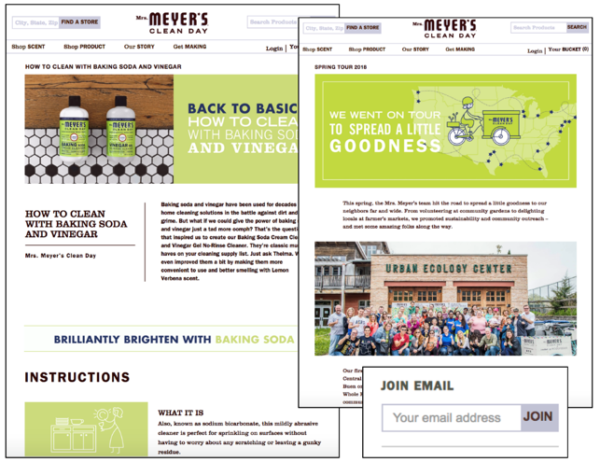
Bodybuilding.com
With multiple educational and fitness-based forums, Bodybuilding.com has become a go-to authority in the sports nutrition/health industry. Though the company sells supplements and products bodybuilders seek, its site is content rich, from training regimens and workout plans to nutrition, health, and lifestyle topics. The site is as comprehensive as it is helpful.
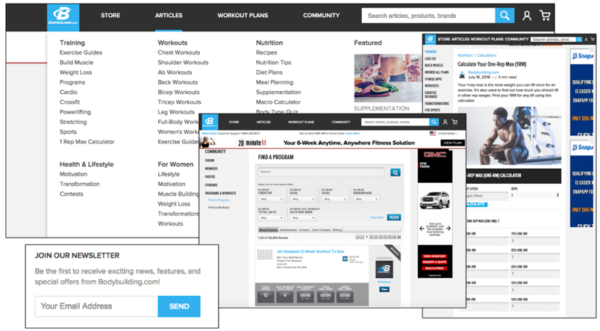
But Bodybuilding.com didn’t stop with content. Its foundation isn’t the supplements, workouts, or recipes, it’s the community it has built. The veil between the brand’s content strategy and business strategy is thin. The real value of joining the Bodybuilding.com community is the opportunity to contribute to and learn from a team of like-minded individuals all interested in attaining better health. User-generated content, a “FitBoard,” member search, and other interactive sub-sections/forums connect people to other people – the fabric of a truly dynamic content marketing initiative.
Lowe’s Home Improvement
Lowe’s puts significant resources into its video marketing, which uses YouTube as its primary distribution vehicle.
Lowe’s YouTube subscribers total over 606,000 – dramatically outnumbering the competition. Home Depot’s channel has about 195,000 subscribers, while Menards has 65,000, and even the biggest retail giant, Walmart, only has 348,000. Lowe’s even generates additional revenue from its channel by driving subscribers back to the website to make purchases.
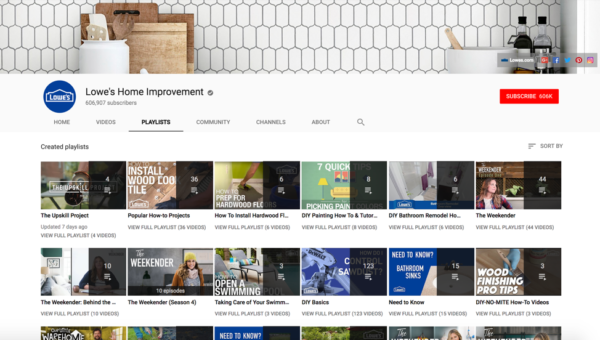
With high-quality content that rivals HGTV’s programming, Lowe’s has created several ongoing series, including how-to videos, DIY basics, and seasonal decorating videos. But one of its biggest hits, The Weekender,” is a real-life makeover series in its fourth season. In it, DIY expert Monica Mangin transforms problem spaces for perplexed homeowners. Most of the videos in the series are anywhere from 15 to 25 minutes long.
Lowe’s also recognizes that a single YouTube channel wouldn’t work for its diverse audience’s interests and needs. It’s created a channel lineup to target niches in its wider audience:
- Lowe’s Open House
- Lowe’s Product Guides
- LowesForPros
- Iris by Lowe’s
- Lowe’s Canada
- DIY Guy
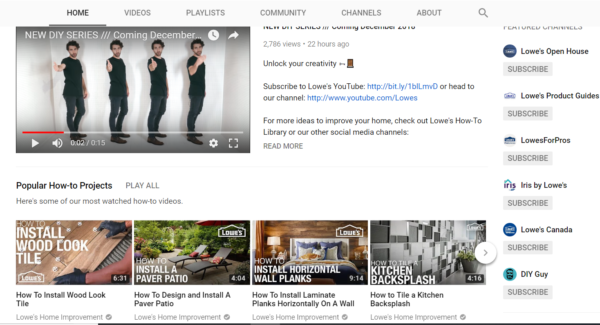
Conclusion
These brands’ content platforms – and, I suspect, those of most top-tier retail brands excelling at content marketing – share several common characteristics. Most of them focus on:
- Delivering what their audience wants to know, learn, be inspired by, etc., rather than promoting why the audience needs their products
- Creating content featuring influencers, fans, and experts who will help them extend the reach of the content to audiences the brands normally wouldn’t reach
- Telling stories about how the brands operate in a larger context, showing how they help and connect with the larger communities
- Picking a niche within their wider consumer audience to ensure that they deliver valuable and relevant content
- Offering multiple formats, from text to video and more, to give their audiences a choice in how to consume the content
- Going beyond creating content to create communities through online forums, user-generated content, etc.
If you care about turning customers (or prospects) into brand fans and loyalists, take inspiration from these seven brands and let these lessons help you improve your content marketing programs.
If improving your content marketing skills is on your to-do list for 2019, register today for the winter semester at Content Marketing University.
Cover image by Joseph Kalinowski/Content Marketing Institute
The post 7 B2C Brands Offer Content Marketing Lessons and Inspiration appeared first on Content Marketing Institute.
great If you’re looking for premium e-liquid, this is the one.
ReplyDelete